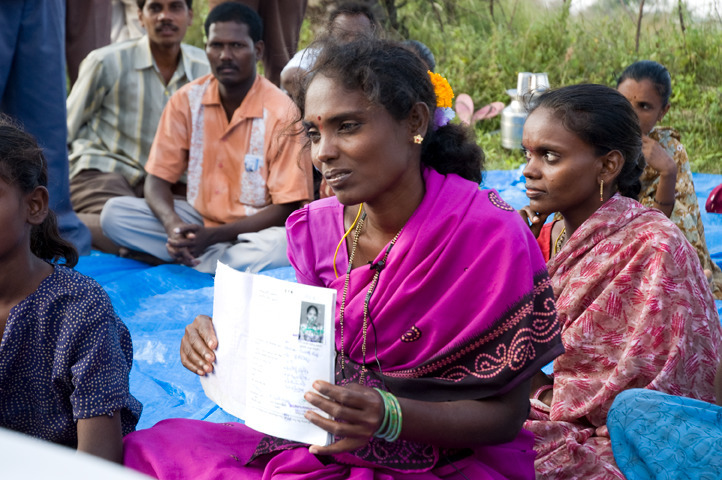By Ayman Soliman
In her rural village in the Chitoor district in Andhra Pradesh, India, Shakti beams with pride in front of a plot of land. “Namma bhoomi,”- “This is our land,” says Shakti.
With the income from her land, Shakti can provide three meals a day for her children and pay the school fees for their education. Shakti also has a new status in her village and her home – a profound change from the days she was a landless laborer, earning about $1 a day. For Shakti, control over land was the impetus for that change.
Land: A foundation for women’s economic empowerment
Shakti benefited from a partnership between the Andhra Pradesh government and the World Bank, where Landesa designed a land purchase program that works like micro-lending. Qualifying small self-help groups of the poorest villagers – mainly women – can receive government grants to purchase land. Shakti and other landless women in her village applied collectively for a loan to buy a plot of land. With assistance from local paralegals, the women negotiated with sellers and split the land parcels among themselves.
Around the world, land is identity, heritage, a source of pride, and of course, a sustainable economic resource. Land is crucial in sustaining livelihoods, ensuring stability and security, and alleviating poverty. However, today, less than one in five landholders worldwide are women, despite comprising nearly half of the world’s agricultural workforce and producing up to 80 percent of food in developing countries.
Despite the transformative benefits for women like Shakti, gender discrimination in access, control, and ownership of land remains a big obstacle to achieving gender equality and women’s economic independence around the world.
Discriminatory laws and social norms impose barriers to women’s rights and access to land in more than half the world. Customary and formal land and property laws and regulations discriminate against women, and even when the laws guarantee women’s rights to land, the implementation and enforcement of these laws are complicated and insufficient.
This impacts economic development in both rural and urban contexts. An evidence review by the International Food Policy Research Institute (IFPRI) found that women’s land rights affects both agricultural and nonagricultural livelihoods by opening up access to credit for land investment. In turn, land investment leads to an increase in agricultural production and facilitates diversification into nonagricultural livelihoods.
Women’s ownership and control over land can also build resilience to climate impacts, with positive outcomes for climate mitigation and adaptation through land investments that promote carbon sequestration, enhanced adaptive capacities, soil and water conservation measures, and other sustainable practices. Conversely, gender inequalities in control and access to land increase women’s vulnerability to climate impacts.
Closing the gap on women’s land rights
The benefits – in economic development, climate resilience, and the fulfillment of women’s human rights – are impossible to deny, and the cost of inaction is too great if we are to make progress on the Sustainable Development Goals. So, what can be done to ensure women and girls enjoy the full benefits of stronger land rights?
- Challenge discriminatory social norms
Social norms and perceptions against women’s ownership of land are often more powerful than written laws, posing a major barrier to women’s fulfillment of their rights. The Stand for Her Land campaign, which advocates for women’s land rights from the grassroots to global level, works on policy advocacy and social norms and behavior change through a growing number of country coalitions in Africa, Asia, and Latin America.
In Colombia, S4HL coalition lead CINEP has organized the Feminist School to support transformation of discriminatory gender norms related to land and territory and to confront gender-based violence that can persist when women attempt to access land. In Bangladesh, the campaign is challenging gendered perceptions about inheritance through community dialogues and a traditional “Pot Song” — a form of folk storytelling — on the theme of women’s land rights.
- Empower grassroots women to lead
Changing discriminatory social norms and practices is not an easy task, especially when these norms are influenced and imbedded by religious practices and laws, as in the cases of inheritance and marriage. It requires dedicating and committing resources at the community level.
Grassroots women are natural leaders in the effort to strengthen women’s land rights. They understand the context and what is necessary for change – raising awareness, building capacity, and changing perceptions of women and girls, not as second-class citizens, but as powerful advocates for change. Their powerful example can also seek to activate male champions for gender justice, with the recognition that women, men, their families and communities all stand to benefit as the balance of power is shifted toward greater equality.
Social norms change when people change their perceptions and realize their gain in upholding a right and advocating for it. It’s a role that grassroots women are crucial to lead.
- Finance solutions from the ground up
Changing social norms requires a bottom-up approach, for communities to act, and for grassroots women to realize their voice and agency in leading for change. That is why the development community must realize the importance of committing resources and finances to support grassroots women, grassroots organizations, and grassroots movements around the world.
Despite the evidence, women’s land rights remains underfunded. It takes time, commitment, and resources to change social norms, and there are a lot of challenges on the way to securing women’s land rights.
When the funding community commits to financing long-term programs and solutions that center grassroots women, a chorus of millions may join Shakti in a global chant, Namma Bhoomi!
——
Ayman Soliman is a Global Advocacy Program Officer with Landesa.

